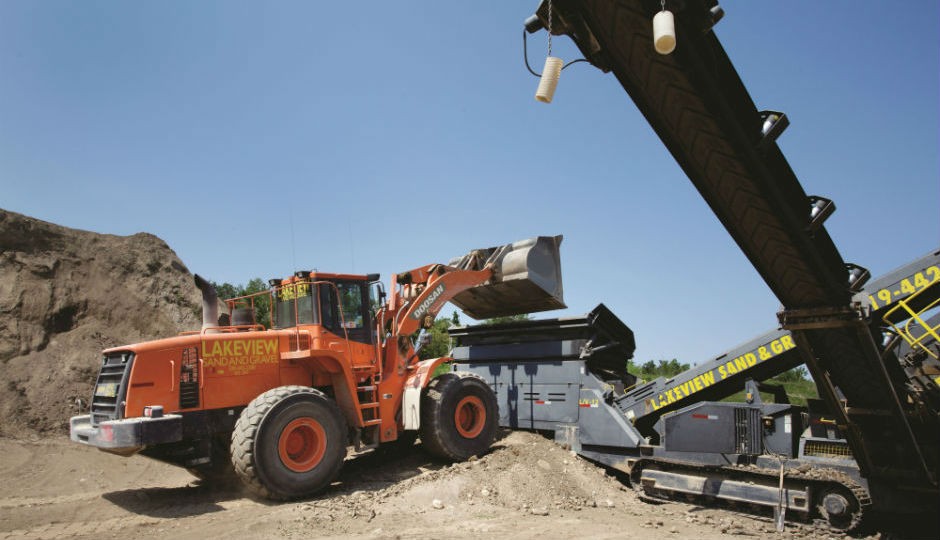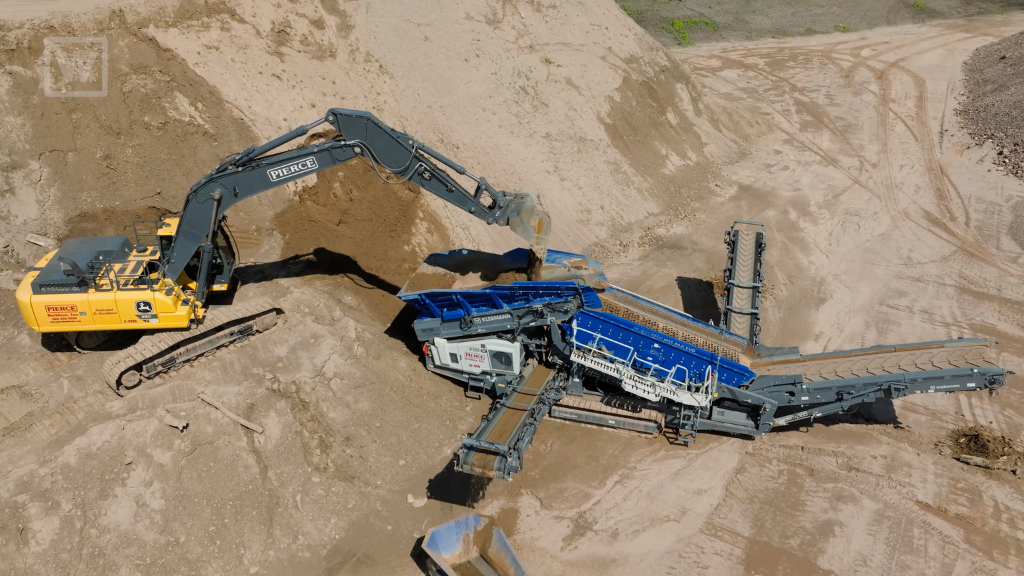
Determining how profitable a company can be is not always based on how many sales it can make but on how much it can save at the same time. Matthew Willson, owner of Lakeview Sand and Gravel in Paris, Ontario has believed in this motto since 2010 when he took over the family run business.
The Willson family got its first taste of owning and operating its own company in 1947 when Willson’s grandfather, Murvyn, started Paris Construction. As the construction business steadily grew, Willson’s father, Robert, decided to try his hand at managing his own business. One of those businesses included the purchase of Lakeview Sand and Gravel in 1980. Growing up in the business and seeing how profitable the sand and gravel pit could be, Willson decided to continue in his father’s footsteps by buying the 300-acre quarry from his father in 2010.
“I have been around machinery all my life,” he says. “That was my job. I did not just do it on the weekend – I would be on the jobsite every morning and running the machine all day. I saw how profitable the business could be and understood how the business worked, so I decided to buy the company.”
Most companies that have a high volume of work, like Lakeview Sand and Gravel, tend to have a handful of full-time employees. However, Willson does things a bit differently.
“We have a very odd business,” he says. “On average, I employ only one person. Then, during our busy season, I employ two people. I do a lot of the work myself.” Willson buys the equipment, sells material, works on invoices, mends fences and runs all of the equipment. Many times, that is all in a day’s work. “I find that anything I can save on is a profit to Lakeview Sand and Gravel,” he says. “Profit doesn’t necessarily mean sales but rather is an indicator of what I am saving.”
To help keep his business profitable while lowering his operating costs, Willson purchased two Doosan wheel loaders, a DL420-3 and DL420-5, to dig, transport and load material that is later screened and sold.
Serving the needs of the community
Willson sells and delivers a variety of material, including granular-recycled limestone, recycled asphalt, virgin gravel, bedding, topsoil and salt. The products are delivered to local municipalities, cities, building contractors, road construction companies and asphalt and concrete plants that are located within an hour-and-a-half radius from the quarry.
Lakeview Sand and Gravel also produces granular A and granular B gravel, clear stone and two types of sand – fine and coarse.
Granular A and granular B gravel are typically used for general construction projects, while the clear stone is sold to concrete and asphalt plants. Fine sand is used for backfill. Coarse sand is converted into salt sand during winter months, and concrete and asphalt sand in summer months.
Willson hires a separate contractor to crush the materials; however, he and his operators process certain materials, sand to clear stone, through a screening processor. At Lakeview Sand and Gravel, oversized stone is screened anywhere from three to eight inches and used mainly for landscaping and drainage projects. After screening, the material is transported via wheel loader to stockpiles or storage bins.
Lakeview Sand and Gravel actively competes with other gravel pits in the area by using a variety of heavy equipment. The company uses an excavator and bulldozer for reclamation work and a backhoe for miscellaneous quarry work. However, the majority of the work is completed with its Doosan DL420-3 and DL420-5 wheel loaders purchased from CG Equipment. Willson bought his first Doosan wheel loader in 2002 and has bought a new Doosan loader approximately every four years.
“I was a bit skeptical at first since I had not seen many Doosan machines before, but the machine was fantastic,” he says. “Our wheel loaders have been the most consistent and reliable machines throughout the years.”
Willson says his family business has owned almost every type of heavy equipment since the 1940s, but his Doosan machines certainly have kept up with the harsh operating environment.
“The majority of my business is sand, gravel and recycling,” Willson says. “To keep up with the demand, I wanted an easy-to-operate machine that would help in these applications. I found that I can use my Doosan wheel loaders all day, every day.”
Maximizing wheel loader performance
Both wheel loaders, each equipped with a five-cubic-yard bucket, play a large part in the transporting and screening process. They help to dig the material and dump it into the screening plant, and then load the screened product into trucks ranging from smaller pickup trucks to 40-ton tractor trailers. With dump height of approximately 10 feet, Willson says he can work more efficiently and quickly with the wheel loaders. In addition to transporting material, Willson uses the machines for reclamation work, such as stripping the topsoil.
“The machines really keep up and are very strong,” he says. “We are moving some heavy material – rock, asphalt and recycled material – and the machines can lift it, no problem. There is a lot of capability of strength and power. As much as we have pushed them, they have certainly kept up. During a big tonnage year, we will send out the wheel loaders day after day and month after month. They will work sunup to sundown and still be working great at the end of the day.”
Since the machines are working 10 hours a day, five days a week, Willson says he makes sure he can get the best fuel economy while maximizing machine performance.
“I use the Economy work mode and really notice the fuel change,” he says. “They are very good on fuel economy yet can be pushed hard.”
Maintaining good visibility when working on a large quarry is essential to maximizing loader performance and keeping operators safe, Willson says. “Our wheel loader operators are pretty busy, so when there are a lot of people around, I want them to be able to see who is coming in and out of the gravel quarry. I want them to see other machinery and I want them to see the screening plant equipment while it is working.”
Willson attributes his success to his employees, truck drivers, his reputation, making good business decisions and maintaining reliable equipment. By completing regular service intervals, such as checking the fluids and filters, Willson has bypassed any major issues with his Doosan wheel loaders. However, if he does experience a minor issue, he can easily service his equipment on the site.
“It’s great that I’m not taking panels off of the machine to access the engine compartment when I’m checking the filters, oils and fluids,” he says. “Even when the guys are doing a daily service check around the wheel loader, everything can be done on the ground. That’s nice because you’re not climbing all over the machine.”
“I think the way I work smart is by working hard,” Willson says. “My employees work hard, I work hard, but the machines work just as hard.”



